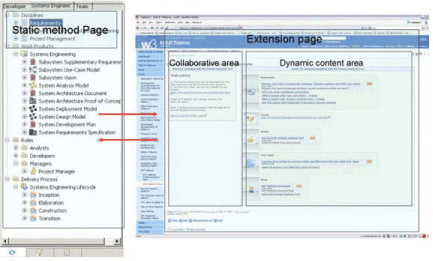|
An implementation of this kind of method:
- Identifies the points in the static method that can be extended.
- Provides links to collaboratively built dynamic contents from these extension points.
- For each link, provides a wiki page with two areas:
- Up-to-date editable textual information
- Dynamically populated Web feeds on social bookmarks, people, activities, blogs, or asset
Here's how the method works and is implemented for a particular Service-Oriented Architecture
(SOA) analysis scenario (see Figure 3):
Figure 3. Collaborative and dynamic method implementation

An example of how it can be used is as follows: A software architect in an SOA engagement is
currently involved in the analysis of an SOA system. In SOA, one of the core activities is called
service identification. Because SOA projects are by their very nature complex, and because SOA is
still in the process of being understood, SOA activities and the tools to support these activities are
fully understood only by a small number of practitioners.
It's highly unlikely that a static method includes up-to-date content on the best practices around
these activities or, indeed, the tooling that could make these activities more streamlined. To address
this shortcoming, extension points are identified in the base method. Where the static method is
rendered in HTML, these extension points are hyperlinks from inside the method. In this example,
the SOA architect is doing service identification. The static method contains high-level guidance
around service identification and a link to collaboratively built dynamic content on specific tools used
for service identification. This link brings the architect to a collaborative Web site, such as a wiki dedicated to this extension point. |